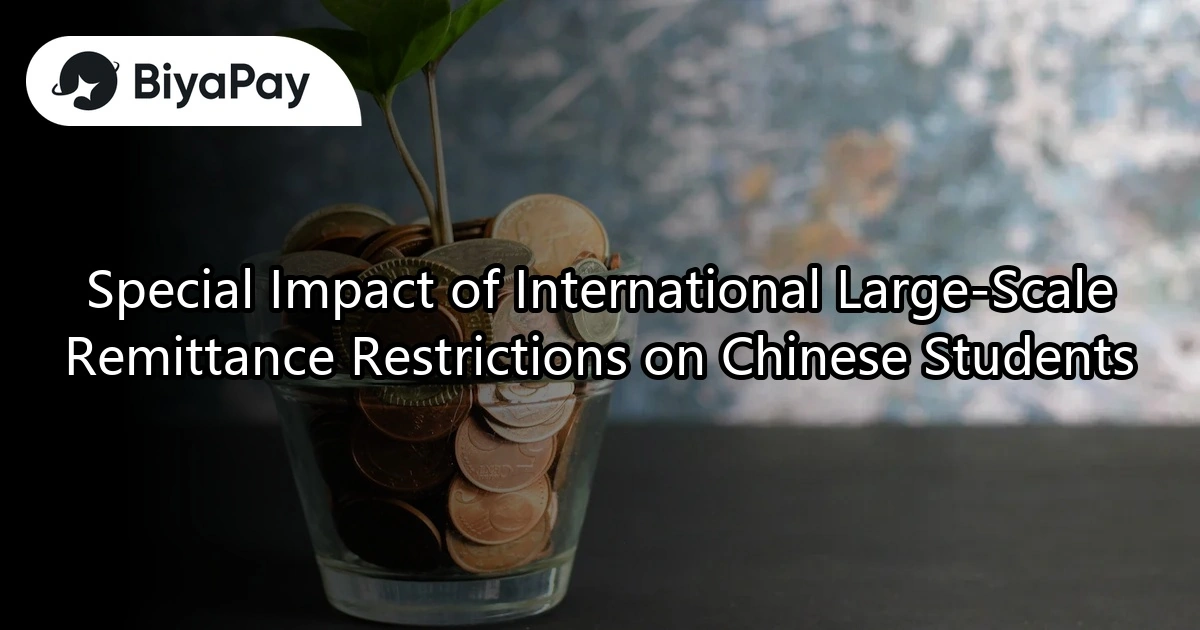- EasyCard
- Trade
- Help
- Announcement
- Academy
- SWIFT Code
- Iban Number
- Referral
- Customer Service
- Blog
- Creator
Special Impact of International Large-Scale Remittance Restrictions on Chinese Students

Image Source: pexels
Have you ever felt anxious because funds couldn’t be transferred in time when preparing to pay tuition or arrange living expenses? International large-scale remittance restrictions are posing unprecedented challenges for many Chinese students and their families. You may find that delays in fund transfers not only affect your study plans but may also expose you to legal risks. For families, the additional financial pressure is hard to ignore. Tuition, accommodation fees, and daily expenses—these seemingly simple transfer needs may become complicated due to policy restrictions. Facing these issues, you are not alone, but the key to resolution lies in finding appropriate coping strategies.
Main Provisions of International Large-Scale Remittance Restrictions
Core Content of Cross-Border Remittance Policies in Various Countries
When you plan cross-border remittances, the policies of different countries may leave you confused. Many countries impose strict regulations on international large-scale remittances to prevent money laundering and illegal fund flows. These policies typically require detailed proof of the source of funds and a description of their purpose. For example, China’s State Administration of Foreign Exchange has clear restrictions on individual cross-border remittances, while the United States and EU countries place greater emphasis on the transparency and compliance of funds. Understanding the core content of these policies can help you better plan fund flows and avoid unnecessary trouble.
Remittance Amount Caps and Procedural Requirements
Different countries have varying regulations on remittance amount caps and procedural requirements. Below are some common restrictions and requirements:
| Regulation Content | Amount Cap | Remarks |
|---|---|---|
| Cross-border CNY remittance for individuals in Hong Kong, Macao, and Taiwan | Amounts exceeding $50,000 require reporting | Valid identification and original exchange receipt required |
| Overseas investment remitted to domestic individual accounts | Cannot be credited | Restricted by the State Administration of Foreign Exchange |
| Remittances exceeding $3,000 | Requires prior declaration | Requires bank approval before crediting |
These regulations may cause inconvenience during remittances, but their purpose is to ensure the legality of fund flows. Preparing relevant documents and proof in advance can make your remittance process smoother.
Specific Impact on Students’ Fund Flows
International large-scale remittance restrictions have a particularly significant impact on students. Tuition payments may be delayed due to exceeding amount limits, and living expense transfers may be hindered by cumbersome procedures. These issues not only affect your daily life but may also increase your stress levels. However, by understanding the policies and adopting appropriate coping measures, you can reduce the negative impact of these restrictions. Remember, planning and communication are key to resolving issues.
Practical Problems Faced by Students

Image Source: pexels
Difficulties in Tuition Payments and Consequences of Delays
You may have noticed that international large-scale remittance restrictions significantly affect tuition payments. Many schools require a one-time payment for an entire semester or year’s tuition, but amount caps may prevent you from completing this task. Delays in tuition payments can lead to serious consequences, such as inability to register for courses, loss of scholarship eligibility, or even impacts on your visa status.
To avoid these issues, you can try the following methods:
- Plan Ahead: Before the semester starts, ensure your funds are prepared and meet remittance requirements.
- Communicate with the School: Many schools allow installment payments or offer special arrangements. Proactively contacting the school and explaining your situation may provide assistance.
- Use Third-Party Payment Platforms: Some platforms can help you complete tuition payments quickly and securely while complying with international remittance regulations.
Tip: Don’t wait until the last minute to address tuition issues. Acting early can reduce stress and ensure your study plans proceed smoothly.
Impact of Blocked Living Expense Transfers on Daily Life
Living expenses are the foundation of a student’s daily life, but international large-scale remittance restrictions may prevent you from receiving funds in time. You may face difficulties paying rent, buying food, or covering transportation costs. This situation not only affects your quality of life but may also make you feel isolated and helpless.
Here are some suggestions to address living expense transfer issues:
- Split Transfers: Break large transfers into multiple smaller ones to reduce the risk of restrictions.
- Seek Part-Time Opportunities: Earn extra income through legal part-time work to alleviate financial pressure.
- Communicate with Banks: Understand your bank’s policies and services to choose the most suitable remittance method.
Tip: Maintain a positive mindset and seek solutions. Every challenge is an opportunity for growth.
Increased Remittance Fees and Their Impact on Financial Burden
International remittances often come with high fees, and large-scale remittance restrictions may further increase your financial burden. The rise in fees can put pressure on your family, especially with frequent remittances. These additional costs may consume your living expense budget, forcing you to cut back on other expenses.
You can take the following measures to reduce the impact of fees:
- Compare Remittance Methods: Choose banks or payment platforms with lower fees.
- Utilize Discount Policies: Some banks offer student-specific remittance discounts; proactively inquire to save costs.
- Reduce Transfer Frequency: Minimize cumulative fees by consolidating transfers or planning ahead.
Tip: Every penny counts. With proper planning, you can minimize financial burdens.
Solutions to Address International Large-Scale Remittance Restrictions

Image Source: pexels
Use of Legitimate Third-Party Payment Platforms
When facing international large-scale remittance restrictions, choosing legitimate third-party payment platforms can be an efficient solution. These platforms are not only user-friendly but also help you bypass the cumbersome procedures of traditional banks. Platforms like Alipay, WeChat Pay, and UnionPay Business have become top choices for many students and families.
Data shows these platforms have a significant market share:
| Payment Platform | Market Share |
|---|---|
| Alipay | 34.5% |
| WeChat Pay | 29% |
| UnionPay Business | 10.2% |
| Total | 73.7% |
These figures indicate a high success rate for cross-border payments using these platforms. You can quickly complete tuition payments or living expense transfers while ensuring the security and compliance of fund flows.
Tip: When choosing a payment platform, ensure it complies with local laws and regulations and keep your account information secure.
Implementation of Split Transfer Strategies
If the amount you need to transfer exceeds policy caps, splitting transfers is a simple and effective strategy. Dividing large sums into multiple smaller transfers not only reduces the risk of restrictions but also allows more flexible fund management.
When implementing split transfers, follow these steps:
- Create a Plan: Plan the amount and timing of each transfer based on tuition and living expense needs.
- Choose Suitable Channels: Different banks and platforms have varying fees and transfer speeds; select the most appropriate option.
- Record Each Transfer: Keep clear records of the source and purpose of each transfer for future reference.
By splitting transfers, you can effectively reduce the inconvenience caused by large-scale remittance restrictions while avoiding legal issues from single large transfers.
Tip: While split transfers require more time, they make fund flows safer and more stable.
Effective Methods for Communicating with Schools or Banks
When facing remittance issues, communication with schools or banks is critical. Many schools offer flexible payment options for international students, such as installment plans or deferred payments. Proactively contacting the school and explaining your situation may buy you more time and support.
Additionally, communicating with banks can help you find more suitable remittance methods. Research shows that central bank communication during special periods can stabilize market fluctuations in the short term. This suggests that timely communication with banks can provide more effective solutions.
| Research Content | Conclusion |
|---|---|
| Effectiveness of Central Bank Communication During the COVID-19 Pandemic | Central bank communication can stabilize stock market fluctuations in the short term, but mid- to long-term effects are limited. |
| Role of Investor Sentiment | Investor sentiment is a key channel for the impact of central bank communication on market fluctuations. |
You can improve communication efficiency by:
- Preparing Thoroughly: Gather all relevant documents, such as tuition bills, identification, and remittance records, before contacting schools or banks.
- Clarifying Needs: Clearly articulate your issues and requirements to avoid misunderstandings.
- Remaining Patient: Processing international remittance issues may take time; patience is key to resolution.
Tip: Communication is a vital bridge to problem-solving. Proactive, clear, and patient communication can help you find the best solutions.
Key Measures to Ensure Remittance Compliance
Necessity of Complying with Foreign Exchange Regulations
Complying with foreign exchange regulations is not only a legal requirement but also a critical safeguard for fund security. You may not realize that foreign exchange violations can lead to severe consequences, such as fines, account freezes, or impacts on future financial activities. Here are some key points to understand the importance of compliance:
- International balance of payments reporting is a core component of foreign exchange management, directly affecting the compilation of a country’s balance of payments table.
- Behaviors like capital flight and illegal foreign exchange trading violate the Foreign Exchange Administration Regulations of the People’s Republic of China and require a legitimate transaction basis.
- In IPO reviews, foreign exchange violations may lead to review termination. For instance, a case involving illegal foreign exchange trading exceeding 70 million yuan resulted in severe penalties for the controlling shareholder.
By complying with foreign exchange regulations, you can avoid legal risks and provide a stable foundation for your family’s and personal financial planning.
Providing Proof Documents to Ensure Legality
When conducting international remittances, providing complete proof documents is key to ensuring legality. Banks and relevant institutions typically require the following:
- Proof of Fund Source: Such as payslips, tax records, or bank statements.
- Purpose Description: Such as tuition bills, rental contracts, or living expense budgets.
- Personal Identification: Copies of passports or ID cards.
These documents not only expedite remittance approvals but also reduce the risk of rejection. Preparing these materials in advance ensures compliance with requirements for each transfer.
Tip: Keep documents clear and complete to avoid delays due to insufficient information.
Specific Suggestions to Avoid Legal Issues
To avoid legal issues arising from international large-scale remittance restrictions, take these practical steps:
- Follow Data Management Requirements: Especially when handling sensitive information, ensure all data complies with legal and regulatory standards.
- Consult Professionals: Compliance departments or legal advisors can help assess the legality of remittances and avoid potential risks.
- Regularly Review Account Activity: Ensure every transaction is clearly documented to prevent issues from errors.
Professional compliance assessments protect your interests and maintain market trust and stability. These measures allow you to handle international remittances with greater confidence.
Tip: Proactively learning relevant legal knowledge and consulting professional advice are the best ways to avoid legal issues.
Conclusion
International large-scale remittance restrictions profoundly affect Chinese students. They increase the complexity of tuition payments and living expense arrangements and may pose legal risks. However, you can effectively address these challenges by choosing appropriate remittance methods and ensuring compliance.
- Choose Secure Remittance Methods: For example, integrated financial and tax services ensure fund security through measures like data encryption and access control. A large manufacturing company successfully avoided data breaches by adopting SSL/TLS protocol encryption for data transmission.
- Ensure Compliance: Strict permission management and multi-factor authentication can prevent unauthorized access, protecting your financial data.
Take action, plan ahead, and communicate proactively. Every effort will make your study abroad experience smoother!
FAQ
1. How to Choose a Suitable Remittance Method?
When choosing a remittance method, consider:
- Fees: Compare fees across platforms.
- Speed: Opt for methods with fast settlement.
- Security: Ensure the platform complies with local laws.
Tip: Using reputable platforms like Alipay or bank transfers is safer and more reliable.
2. What Should I Do If a Remittance Is Rejected?
If a remittance is rejected:
- Contact the bank or payment platform to understand the reason.
- Check if all required proof documents were provided.
- Adjust the remittance amount or method based on policies.
Reminder: Stay patient; timely communication is key to resolution.
3. How Can I Reduce Remittance Fees?
Reduce fees by:
- Comparing fee structures of banks or platforms.
- Using student discount policies.
- Consolidating transfers to reduce frequency.
Tip: Plan transfer amounts in advance to avoid unnecessary costs.
4. Can Remittance Delays Affect My Visa?
Remittance delays may affect tuition payments, impacting visa status. You can:
- Communicate with the school early to request deferred payments.
- Provide proof of funds to explain special circumstances.
Note: Address remittance issues promptly to avoid visa risks.
5. How to Ensure Remittance Compliance?
To ensure compliance:
- Provide proof of fund source and purpose.
- Adhere to foreign exchange regulations.
- Consult professionals for policy details.
Tip: Legal remittances protect your interests and prevent legal issues.
International large-amount transfer restrictions create challenges for Chinese students, from high fees and delayed funds to compliance risks for tuition and living expenses. BiyaPay offers a secure, efficient cross-border payment solution! Exchange over 30 fiat currencies and 200+ cryptocurrencies with transparent real-time rates, and enjoy transfer fees as low as 0.5% across 190+ countries, with same-day initiated, same-day delivered transfers. Sign up for BiyaPay in just one minute to seamlessly handle tuition payments, living expense transfers, and US/HK stock investments without complex procedures. Plus, grow idle funds with a 5.48% annualized yield on flexible savings. BiyaPay leverages blockchain technology to ensure fund security, backed by U.S. MSB and SEC licenses for compliance. Start now—join BiyaPay to overcome transfer hurdles and enjoy a hassle-free study abroad experience!
*This article is provided for general information purposes and does not constitute legal, tax or other professional advice from BiyaPay or its subsidiaries and its affiliates, and it is not intended as a substitute for obtaining advice from a financial advisor or any other professional.
We make no representations, warranties or warranties, express or implied, as to the accuracy, completeness or timeliness of the contents of this publication.




Contact Us
Company and Team
BiyaPay Products
Customer Services
is a broker-dealer registered with the U.S. Securities and Exchange Commission (SEC) (No.: 802-127417), member of the Financial Industry Regulatory Authority (FINRA) (CRD: 325027), member of the Securities Investor Protection Corporation (SIPC), and regulated by FINRA and SEC.
registered with the US Financial Crimes Enforcement Network (FinCEN), as a Money Services Business (MSB), registration number: 31000218637349, and regulated by FinCEN.
registered as Financial Service Provider (FSP number: FSP1007221) in New Zealand, and is a member of the Financial Dispute Resolution Scheme, a New Zealand independent dispute resolution service provider.



















